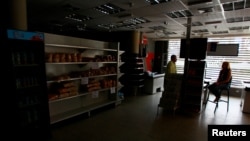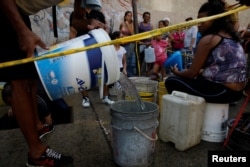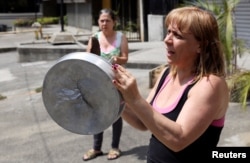Venezuela's opposition leader, Juan Guaido, called for protests Monday after President Nicolas Maduro announced a 30-day plan to ration electricity.
Guaido, who has been recognized by the United States and about 50 other countries as Venezuela's legitimate leader, said in a Twitter post Sunday, "We'll see each other in the streets tomorrow," adding "We will not hide from the dictator."
Maduro said in a speech Sunday on national television the rationing plan will help deal with power outages that have also affected the country's water supply and communications.
He said schools would remain closed and the length of the workday will be cut to conserve power during the 30-day period.
In another development, the president of the International Committee of the Red Cross, Peter Maurer, told VOA on Monday that he hopes to go to the country soon.
"I hope to visit Venezuela soon, and we are working on such a visit," he said in an interview.
The ICRC already has teams in the country and in neighboring Colombia, and has been scaling up its humanitarian response. Maurer said the whole Red Cross and Red Crescent movement is doing their "best to fill gaps, to assist Venezuelans where needs are."
On Friday, the International Federation of the Red Cross — which along with the ICRC and national societies make up the Red Cross and Red Crescent Movement — announced that after meetings in Caracas, they had reached an agreement to scale up health activities across the country, where the healthcare system has been in crisis for months.
On Sunday, residents in Venezuela's capital, Caracas, fed up with the recurring electrical blackouts, protested by banging on pots, burning garbage in the streets and shouting curses against President Maduro.
"No one can put up with this," a Caracas housewife complained Sunday as she tried to buy a chicken, but discovered the bank machines didn't work. "There's been no water since last Monday. You can't call by phone. We can't pay with cards or even eat."
Another homemaker said she can't refrigerate food and said when her appliances break, it's impossible to buy a replacement.
Maduro has blamed the blackouts on U.S. sabotage.
Guaido says Maduro's government neglect and mismanagement are responsible.
"They brought the electrical system to a collapse because they are corrupt and now they can't resolve it because they are incapable," he said.
Guaido used his constitutional authority as head of the National Assembly to declare the Maduro presidency illegitimate, saying he was re-elected in December in a fraudulent vote.
Washington has imposed numerous sanctions against the Maduro government, but Maduro is refusing to step down.
Margaret Besheer at the United Nations contributed to this report.







